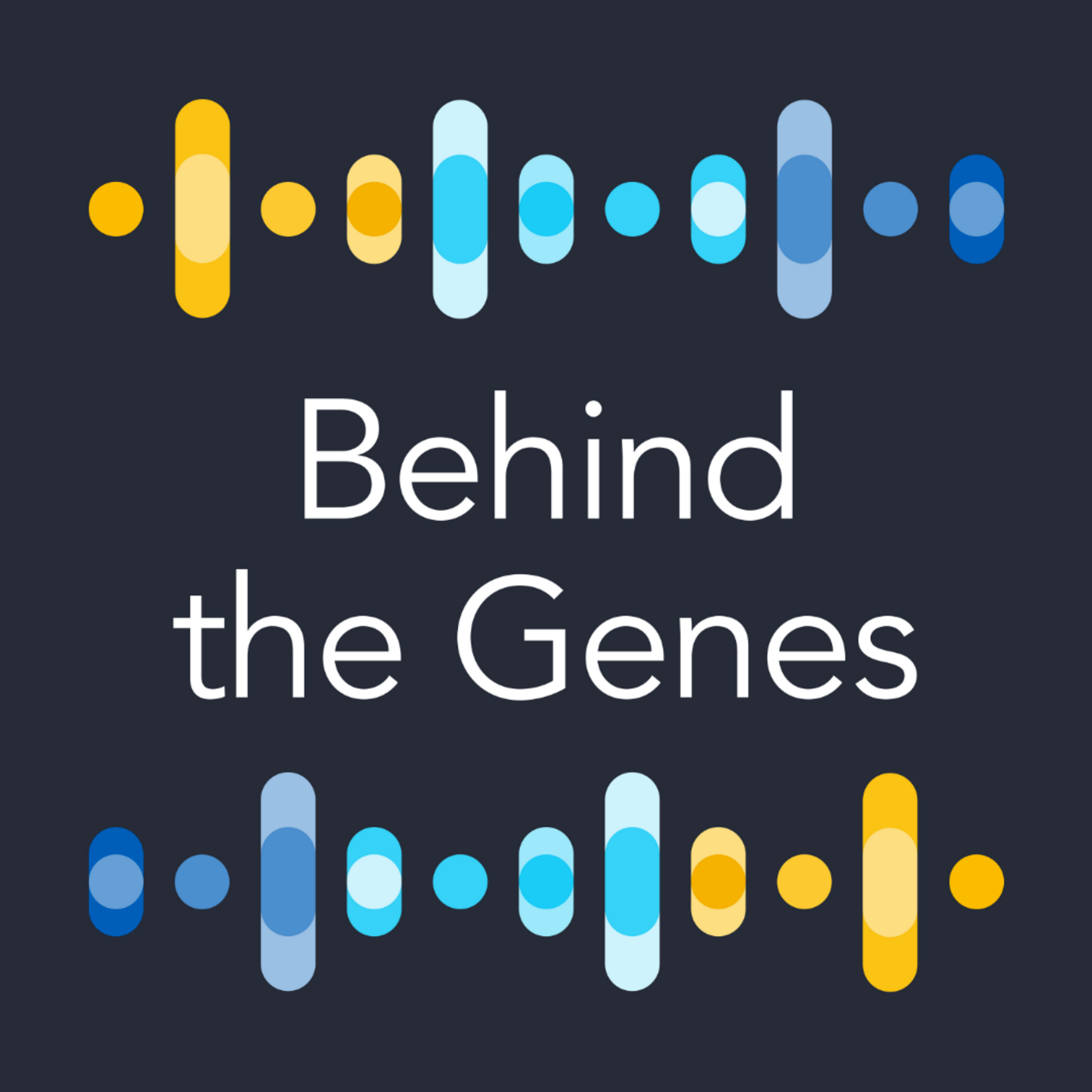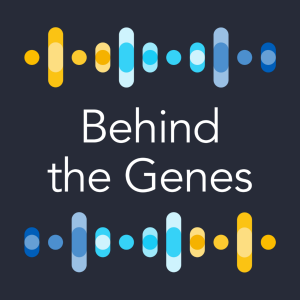
We are Genomics England and our vision is to create a world where everyone benefits from genomic healthcare. Introducing our refreshed podcast identity: Behind the Genes, previously known as The G Word. Join us every fortnight, where we cover everything from the latest in cutting-edge research to real-life stories from those affected by rare conditions and cancer. With thoughtful conversations, we take you behind the science. You can also tune in to our Genomics 101 explainer series which breaks down complex terms in under 10 minutes.
Episodes

Wednesday Jul 14, 2021
Hopkins Van Mil: The significance of public dialogue
Wednesday Jul 14, 2021
Wednesday Jul 14, 2021
“Public dialogue allows citizens, people, members of the public, people like you and me, and broader than that, to come together, to learn about an issue, to talk with specialists in that issue, to engage with each other in that space, and to consider a whole range of diverse perspectives.”
In this week’s episode of The G Word, our CEO Chris Wigley is joined by Henrietta Hopkins, the Director, Insight and Innovation at Hopkins Van Mil. Henrietta is an expert Lead Facilitator and designer of deliberative dialogue research with a particular interest in bringing creativity to public and stakeholder engagement and capacity building. Chris is also joined today by Suzannah Kinsella, Senior Associate at Hopkins Van Mil. She designs engagement activities that help people to influence policies and services in informed and constructive ways. They have both have been involved in a number of specialist dialogue projects run by Hopkins Van Mil, including The National Food Strategy public dialogue and Public dialogues for the Royal Society on gene editing, and neural interfaces.
Today, the group talks about public dialogue, genetic technology and the exploration of the potential for a newborn sequencing programme Hopkins Van Mil has been working on. They discuss how newborn sequencing can help understand the prevalence of rare diseases and develop treatments and how public dialogue allows people to learn, engage and talk to specialists.

Wednesday Jul 07, 2021
Saskia Sanderson: Getting ordinary people to the table
Wednesday Jul 07, 2021
Wednesday Jul 07, 2021
“Why wouldn't we, as a society, seriously start debating the earliest appropriate age where we should start using genomics, not only for treatment and diagnosis, but also for prevention and facilitating earlier detection? Maybe for some it's 18, maybe for others it's childhood - but these are the sorts of questions that we should be debating.”
In this week’s episode of The G Word #sciencepodcast, our CEO Chris Wigley is joined by Saskia Sanderson, Chief Behavioural Scientist at Our Future Health and chartered psychologist. Saskia has a particular interest in applying psychology to translate genomics into better ways to help others, is a freelancer at PHG Foundation and is former Senior Research Social Scientist at Great Ormond Street.
Today, Saskia talks about polygenic risk scores, how scientific research affects real people and sharing GP’s patient data. She also talks about her early career and how we can facilitate public debate.

Wednesday Jun 30, 2021
Helen Stokes-Lampard: Social prescribing and equity of access
Wednesday Jun 30, 2021
Wednesday Jun 30, 2021
“I see a future where people's whole genome will be known at a very early stage in their life, and we will be able to look at social factors and health inequalities and target help and support earlier for those in greater need. There will be huge logistical challenges, of course, but this technology isn't going away, this is here. It's how we apply it for the greatest good that matters.”
In this week’s episode of The G Word #sciencepodcast, our CEO Chris Wigley is joined by Helen Stokes-Lampard, Chair of the Academy of Medical Royal Colleges, Professor of GP Education at the University of Birmingham and Chair of the National Academy for Social Prescribing. Still a practising GP in Staffordshire, Helen is a huge advocate for mental health and has published several papers on women’s health and COVID-19.
Today, Helen talks about equity of access for patients, social prescribing and genomics. She also talks about her early career and her role as Chair of the Academy of Medical Royal Colleges.

Wednesday Jun 23, 2021
GenOMICC COVID-19 Study: Genomics and COVID-19
Wednesday Jun 23, 2021
Wednesday Jun 23, 2021
“Most of the genome is the same for everyone, but there are some places where you can have some variation. This variation, in this case between the people who had severe COVID-19 and the general population, highlights certain areas of the genome. Our job is to try to understand this region.”
In this week’s episode of The G Word #sciencepodcast, our CEO Chris Wigley is joined by Erola Pairo-Castineira, Suzi Walker, Athanasios Kousathanas and Dorota Pasko, all members of a collaborative effort between Genomics England and the GenOMICC consortium, led by the University of Edinburgh, to utilise genomics to better understand the human response to COVID-19.
The group talk about the publication of their findings in Nature, whole genome sequencing and 100K participants and their value as validation cohort. They also talk about CloudRE and their plans for the future.

Wednesday Jun 16, 2021
Dr Patrick Short: Revolutionising research
Wednesday Jun 16, 2021
Wednesday Jun 16, 2021
“It's a real power of some of the translational research that's being done that you can not only answer interesting, fundamental biological questions, but also impact people directly in the process.”
In this week’s episode of The G Word, our CEO Chris Wigley is joined by Dr Patrick Short, genomic researcher, bioinformatician and Co-Founder and CEO of Sano Genetics. For his PhD Patrick worked on the Deciphering Developmental Disorders (DDD) project, with his findings and methods being used in Genomics England's 100k analysis, and he has designed and taught courses on machine learning and data science at Cambridge Spark.
Today Patrick talks about the human aspect of research, precision medicine research and industry access to data. He also discusses the Deciphering Developmental Disorders project and his work with Sano Genetics.

Wednesday Jun 09, 2021
Matt Clifford: Machine learning and start-ups
Wednesday Jun 09, 2021
Wednesday Jun 09, 2021
“What can machine learning do? You know, it's like having a million interns. It's not they can do everything that your core business needs to be able to do, but there are some things they can do very well. And if you can have a million of them, then there are things you can achieve that would be almost impossible to achieve with human scale, with normal numbers of people.”
In this week’s episode of The G Word, Chris Wigley is joined by Matt Clifford, co-founder and CEO of Entrepreneur First and board member at Code for Girls. Matt holds degrees from Cambridge and MIT, where he was a Kennedy Scholar, and was awarded an MBE for services to business in the 2016 Queen’s Birthday Honours.
Today, Matt talks about successful start-ups, tech developments within genomics and the value of investors. He also discusses his work with Entrepreneur First and the power of machine learning.

Wednesday Jun 02, 2021
Christine Patch: The value of data
Wednesday Jun 02, 2021
Wednesday Jun 02, 2021
“Rare disease families really understand that data is important. Examining the family's genetics and bringing together groups of people with individual rare diseases to examine their genetics, and try and understand what's going on, has the potential to lead to both diagnosis and potential treatments. So they understand the power of data.”
In this week’s episode of The G Word, Chris Wigley is joined by Christine Patch, Clinical Lead for Genetic Counselling at Genomics England and Principal Staff Scientist in Genomic Counselling at the Society and Ethics Research group. An early advocate of genetic science, she became one of only 30 genetic nurses in the UK in 1989, and has subsequently worked as President of the European Society of Human Genetics and sat on the Human Genetics Commission.
Today, Christine talks about patient confidentiality and the code of duty, her early career in genetics and her role as Caldicott Guardian at Genomics England. She also discusses the intricacies of patient choice and the priorities for rare disease families.

Wednesday May 26, 2021
Rebecca Skippage: Disinformation and the evolution of news
Wednesday May 26, 2021
Wednesday May 26, 2021
“The news media can do a lot better. Frankly, we need to reflect and represent different communities, and produce material that is more relevant to people who don't necessarily come from privileged backgrounds. Because I think that the way to engage people is to tell stories that have relevance to their lives, rather than this paternalistic ‘we speak, you listen’ approach we see now.”
In this week’s episode of The G Word, Chris Wigley is joined by Rebecca Skippage, News Editor and Anti-Disinformation Lead at the BBC. Having spent much of her career tackling misinformation, in 2020 she also founded a fellowship at Reuters Institute, established to explore best practice in communicating with global audiences and to encourage people to utilise public service media networks.
Today, Rebecca discusses why people from less privileged backgrounds are significantly less likely to turn to news media, how the BBC combats fake news and the importance of social listening. She also talks about her eye-opening report ‘The role of public service media in the fight against disinformation’ and touches on the usefulness of WhatsApp and other similar media platforms.

Wednesday May 19, 2021
Professor Pali Hungin: The human element
Wednesday May 19, 2021
Wednesday May 19, 2021
“The human element is going to become increasingly important. In the presence of high-level technologies, machine learned algorithms and highly personalised precision medicine - perhaps based on genomics - in the presence, even, of all those items, it will be the contact between care delivery and the care receiver that will remain important.”
In this week’s episode of The G Word, Chris Wigley is joined by Professor Pali Hungin, former GP and president of the British Medical Association, emeritus professor at Newcastle University and researcher in gastroenterology and associated clinical and psychological factors. Having received an OBE for services to research in 2000, Pali has spent much of his career attempting to bring about positive change, establishing and leading the Changing Face of Medicine project at the Academy of Medical and Royal Colleges and sitting on the Access Review Committee at Genomics England.
Today, Pali discusses the need for radical change in medicine, suggests clinicians should be armed with genomics and AI, and champions technological advancements in healthcare. He also discusses his work with the Changing Face of Medicine project and offers some advice for young people hoping to get in to medicine.

Wednesday May 12, 2021
Dr Andrew Roddam: Changing health research for the better
Wednesday May 12, 2021
Wednesday May 12, 2021
“Today we still have a significant number of people who are suffering ill health in later life, and often suffering it because we're diagnosing conditions led to them. We’re getting to people and treating them when they end up with things like stage three or four cancer or dementias; we only pick them up at the point when they start to be clinically visible. And it's really difficult to start to treat those individuals at that point.”
In this week’s episode of The G Word, Chris Wigley is joined by Andy Roddam, renowned epidemiologist and Chief Executive Officer at Our Future Health. Having earned his doctorate degree in Statistics from The University of Oxford and completed a post-doctorate in Infectious Disease Epidemiology, Andy has held several roles across both academia and industry, principally focusing on the application of epidemiological methods to advance the understanding of human disease.
Today, Chris and Andy discuss health data and how best to collect it, interventional research, personalised treatment and the importance of predictive prevention.
